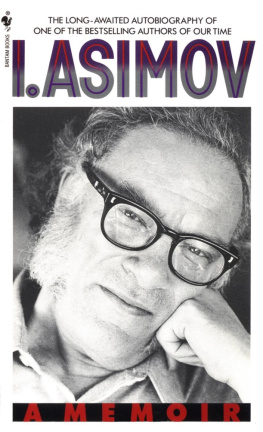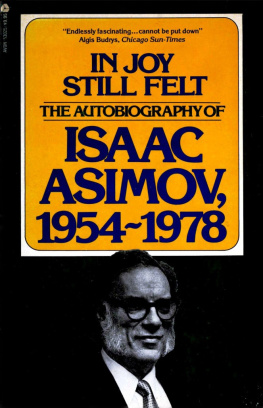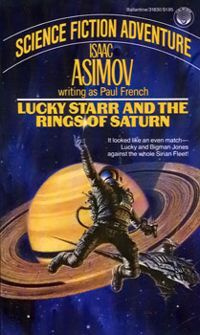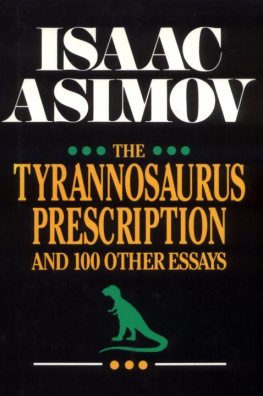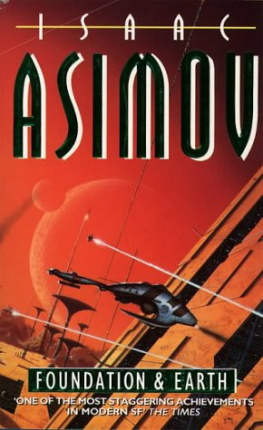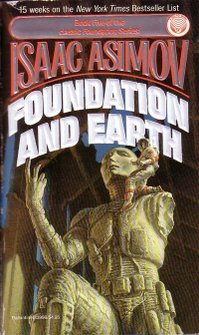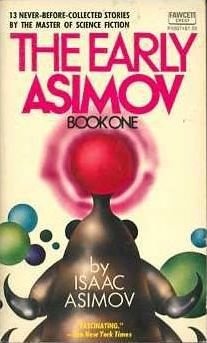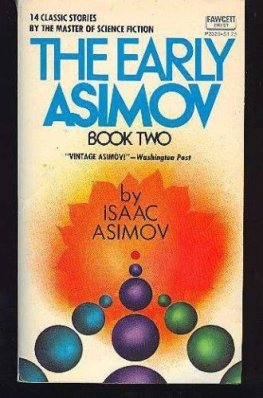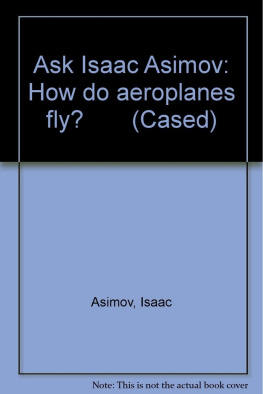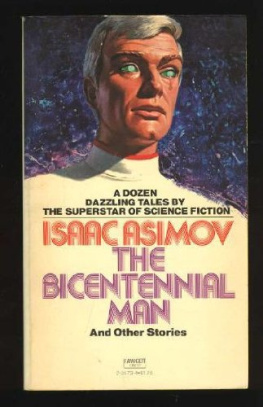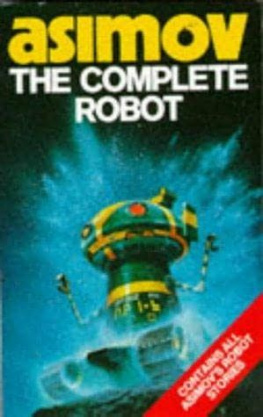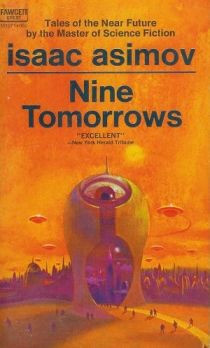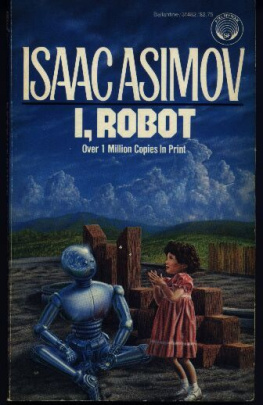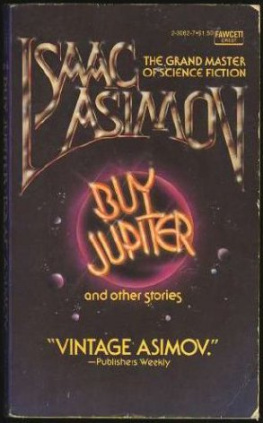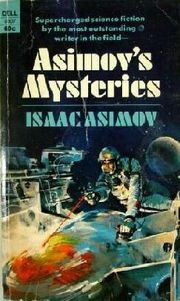Isaac Asimov - I. Asimov: A Memoir
Here you can read online Isaac Asimov - I. Asimov: A Memoir full text of the book (entire story) in english for free. Download pdf and epub, get meaning, cover and reviews about this ebook. year: 1995, publisher: Bantam, genre: Religion. Description of the work, (preface) as well as reviews are available. Best literature library LitArk.com created for fans of good reading and offers a wide selection of genres:
Romance novel
Science fiction
Adventure
Detective
Science
History
Home and family
Prose
Art
Politics
Computer
Non-fiction
Religion
Business
Children
Humor
Choose a favorite category and find really read worthwhile books. Enjoy immersion in the world of imagination, feel the emotions of the characters or learn something new for yourself, make an fascinating discovery.
- Book:I. Asimov: A Memoir
- Author:
- Publisher:Bantam
- Genre:
- Year:1995
- Rating:5 / 5
- Favourites:Add to favourites
- Your mark:
- 100
- 1
- 2
- 3
- 4
- 5
I. Asimov: A Memoir: summary, description and annotation
We offer to read an annotation, description, summary or preface (depends on what the author of the book "I. Asimov: A Memoir" wrote himself). If you haven't found the necessary information about the book — write in the comments, we will try to find it.
I. Asimov: A Memoir — read online for free the complete book (whole text) full work
Below is the text of the book, divided by pages. System saving the place of the last page read, allows you to conveniently read the book "I. Asimov: A Memoir" online for free, without having to search again every time where you left off. Put a bookmark, and you can go to the page where you finished reading at any time.
Font size:
Interval:
Bookmark:
I.Asimov: A Memoir
Contents
In 1977,I wrote my autobiography. Since I was dealing with my favorite subject, I wroteat length and I ended with 640,000 words. Since Doubleday is alwaysoverwhelmingly kind to me, they published it allbut in two volumes. The firstwas In Memory Yet Green (1979), thesecond In Joy Still Felt (1980).Together, they described the first fifty-seven years of my life in considerabledetail.
It hadbeen a quiet life and there was no great excitement in it, so even though Imade up for that by what I considered a charming literary style (I never botherwith false modesty, as you will quickly discover), the publication was not aworld-shaking event. However, some thousands of people found pleasure inreading it, and I am periodically asked if I will continue the tale.
My answeralways is: I have to live it first.
It was mynotion that I ought to wait till the symbolic year of 2000 (always so importantto science fiction writers and futurists) and write it then. However, I will beeighty years old in 2000 and it may just be possible that I may not make ittill then.
When,just before my seventieth birthday, I was stricken with a rather seriousillness, my dear wife, Janet, said to me severely, Start that third volumenow.
Iprotested feebly and said that the last twelve years had seen my life turnquieter than ever. What could I possibly have to say? She pointed out that thefirst two volumes of my autobiography were strictly chronological. I recountedevents in precise order according to the calendar (thanks to a diary Ive keptsince I turned eighteen, to say nothing of an excellent memory) and I had saidalmost nothing about my inner being. She said she wanted something else for thethird volume. She wanted a retrospective in which true events were secondary tomy thoughts, my reactions, my philosophy of life, and so on.
I said,even more feebly, Who would be interested?
And shesaid firmly, for she is even less falsely modest on my behalf than I am on myown, Everybody!
I dont thinkshes right, but she might be, so I intend to try. I dont intend to startwhere the second volume left off. In fact, it would be dangerous to do so. Thefirst two volumes are out of print and many people who might pick up thisvolume and find it interesting (stranger things have happened) would be unableto find the first two volumes in either the hard- or soft-cover incarnation andgrow seriously annoyed with me.
So what Iintend to do is describe my whole life as a way of presenting my thoughts andmake it an independent autobiography standing on its own feet. I wont go intothe kind of detail I went into in the first two volumes. What I intend to do isto break the book into numerous sections, each dealing with some differentphase of my life or some different person who affected me, and follow it as faras necessaryto the very present, if need be.
I trustand hope that, in this way, you will get to know me really well, and, whoknows, you may even get to like me. I would like that.
I wasborn in Russia on January 1, 1920, but my parents emigrated to the UnitedStates, arriving on February 23, 1923. That means I have been an American bysurroundings (and, five years later, in September 1928, by citizenship) since Iwas three years old.
Iremember virtually nothing of my early years in Russia; I cannot speak Russian;I am not familiar (beyond what any intelligent American would be) with Russianculture. I am completely and entirely American by upbringing and feeling.
But if Inow try to discuss myself at the age of three and the years immediately beyond,which I do remember, I am going to have to make statements of the type thathave always led some people to accuse me of being egotistical, or vain, orconceited. Or, if they are more dramatic, they say I have an ego the size ofthe Empire State Building.
What canI do? The statements I make certainly seem to make it clear that I think highlyof myself, but only for qualities that, in my opinion, deserve admiration. Ialso have many shortcomings and faults and I admit them freely, but no oneseems to notice that.
In anycase, when I say something that sounds vain, I assure you it is true and Irefuse to accept the accusation of vanity until somebody can prove that somethingI say that sounds vain is not true.
So I willtake a deep breath and say that I was an infant prodigy.
I dontknow that there is a good definition of an infant prodigy. The Oxford EnglishDictionary describes it as a child of precocious genius. But how precocious?How much genius?
You hearof children who can read at two, who learn Latin at four, who enter Harvard atthe age of twelve. I suppose those are undoubted infant prodigies, and, in thatcase, I was not one.
I supposethat if I had had a father who was an American intellectual, well off and lostin his study of the classics or of science, and if that father had discoveredin me a likely candidate for prodigiousness, he might have driven me onward andgotten something like that out of me. I can only thank whatever chance hasguided my life that this was not so.
Aforce-fed child, driven relentlessly to the very top of his bent, might breakunder the strain. My father, however, was a small storekeeper, with noknowledge of American culture, with no time to guide me in any way, and noability to do so even if he had the time. All he could do was to urge me to getgood marks in school, and that was something I had every intention of doinganyhow.
In otherwords, circumstances conspired to allow me to find my own happy level, whichturned out to be sufficiently prodigious for all purposes and yet kept thepressure at a sufficiently reasonable value to allow me to chug along rapidlywith no feeling of strain whatever. It meant that I kept my prodigiousnessfor all my life, in one way or another.
In fact,when asked if I was an infant prodigy (and I am asked this with disconcertingfrequency), I have taken to answering, Yes, indeed, and I still am.
I learnedto read before I went to school. Spurred on by my realization that my parentscould not yet read English, I took to asking the older children on the block toteach me the alphabet and how each letter sounded. I then began to sound outall the words I could find on signs and elsewhere and in that way I learned toread with a minimum of outside help.
When myfather discovered that his preschool youngster could read and, moreover, whenhe found on questioning that the learning was on my own initiative, he wasastounded. That may have been the first time he began to suspect that I wasunusual. (He kept that feeling all his life, though he never hesitated tocriticize me for my many failings.) The fact that he thought I was unusual, andmade it clear that he did, gave me the first inkling that I was unusual.
I imaginethere must be many children who learned to read before going to school. Itaught my younger sister to read before she went to school, for instance, but Itaught her. No one taught me.
When Ifinally entered the first grade in September of 1925, I was astonished at thetrouble the other children were having with their reading. I was even moreastonished at the fact that after something had been explained to them, theywould forget and would have to have it explained again and again.
That, Ithink, was what I noticed very early in the game; that in my case it was onlynecessary that I be told once. I did not realize that my memory was remarkableuntil I noticed that my classmates didnt have memories like it. I mustinstantly deny that I have a photographic memory. I have been accused of thatby those who admire me beyond my deserts but I always say, I only have anear-photographic memory.
Actually,my memory for things that are of no particular interest to me is not much betterthan normal, if that, and I can be guilty of appalling lapses, when myself-absorption gets the better of me. (I can be remarkably self-absorbed.) Ionce stared at my beautiful daughter, Robyn, without recognizing her, because Idid not expect to see her at the time and was only aware of a vaguely familiarface. Nor was Robyn in the least hurt, or even surprised. She turned to thefriend at her side and said, See, I told you that if I just stood here anddidnt say anything, he wouldnt know me.
Next pageFont size:
Interval:
Bookmark:
Similar books «I. Asimov: A Memoir»
Look at similar books to I. Asimov: A Memoir. We have selected literature similar in name and meaning in the hope of providing readers with more options to find new, interesting, not yet read works.
Discussion, reviews of the book I. Asimov: A Memoir and just readers' own opinions. Leave your comments, write what you think about the work, its meaning or the main characters. Specify what exactly you liked and what you didn't like, and why you think so.

